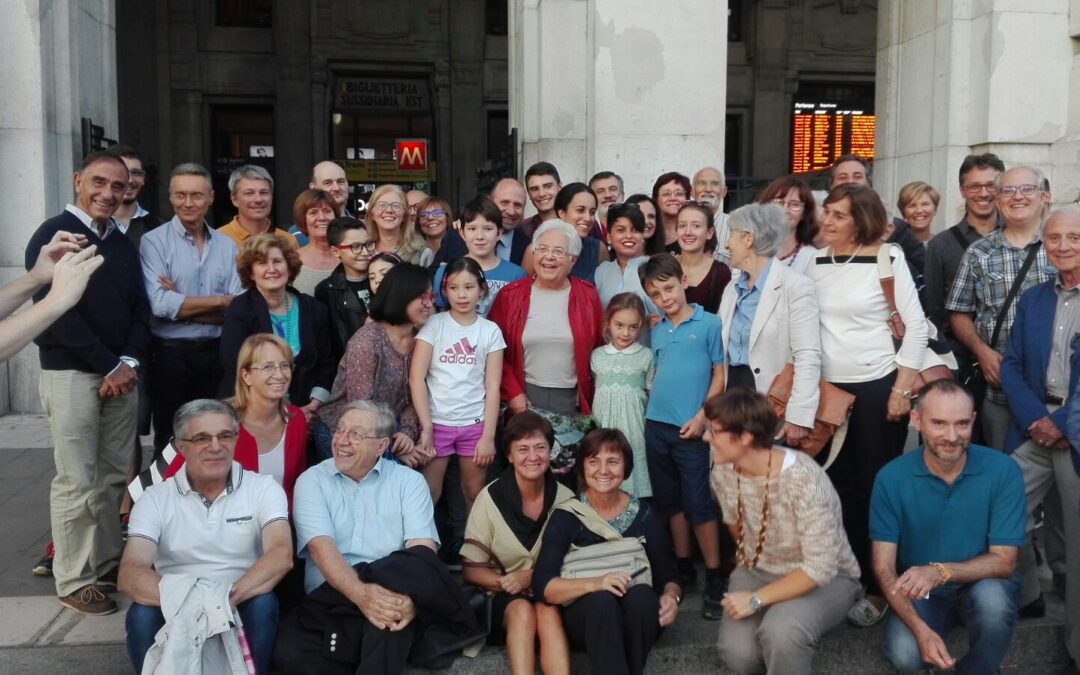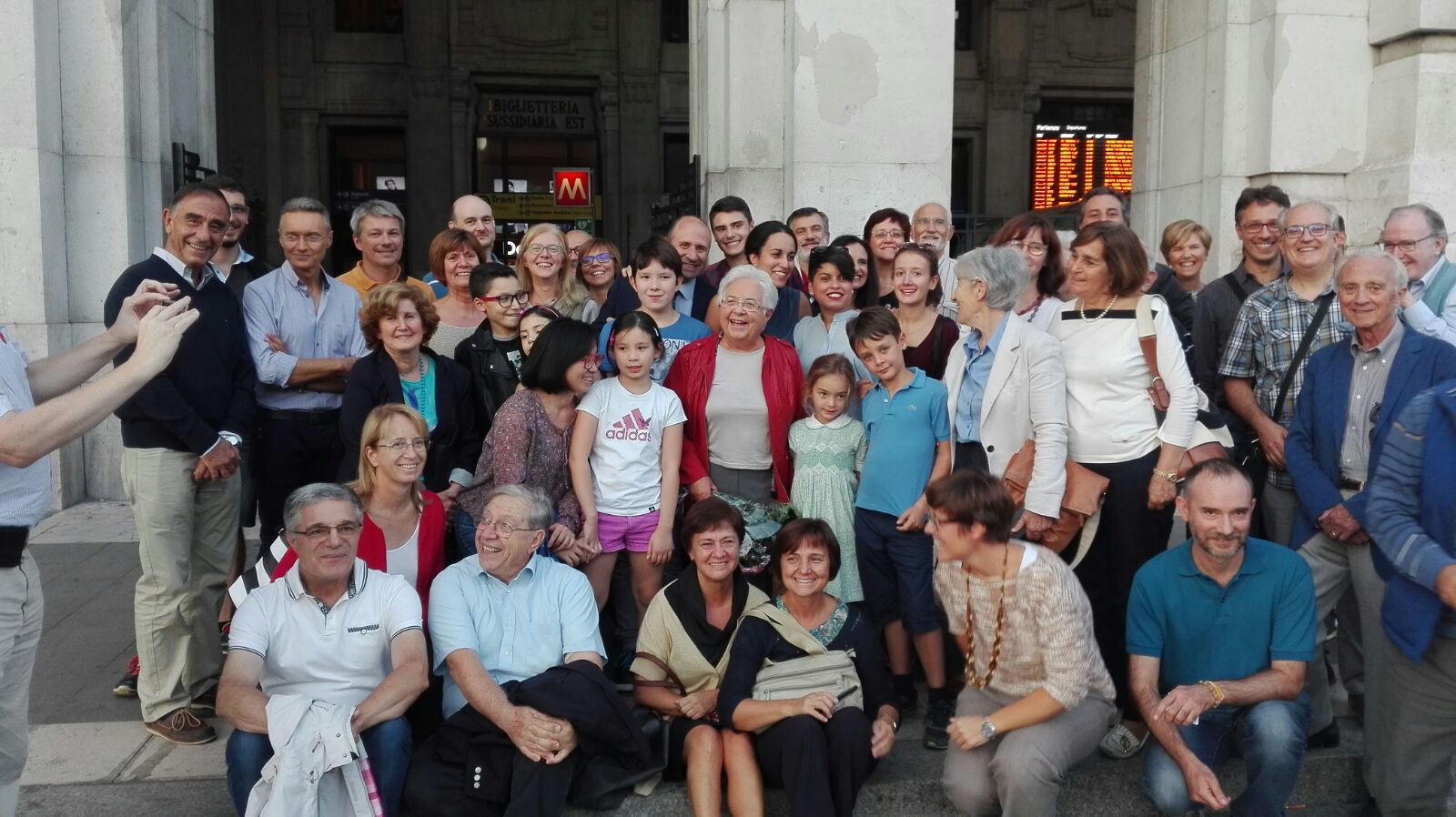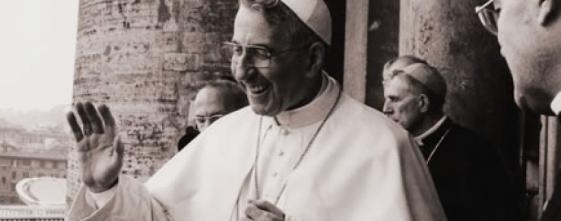
The Focolare thanks everyone

Members of the Focolare community in Milan welcomes Maria Voce.


Members of the Focolare community in Milan welcomes Maria Voce.

 “The “Smiling Pope,” John Paul I, rose to the chair of St. Peter on 26 August, 20 days after Pope Paul VI’s death. Though his brief pontificate lasted only a month, there was time enough for us to receive a smile from him, along with words of benediction.» This is what Chiara Lubich wrote in the book, “The Cry” (1), where she highlighted the uninterrupted rapport established with the successors of Peter, and also with Albino Luciani in the brief stretch of his pontificate. “The new pope has the gift of making himself immediately understood by all – even by children – wrote Guglielmo Boselli (2), then the director of Città Nuova. His language, like that of Jesus, is normal and straight to the point. It is this wisdom coming from the heart that gives the capacity to immediately create a spontaneous relationship: the wonderful gift of one who came from a long pastoral experience, was always in touch with the people, and did not need any difficult speeches typical of professionals of the trade. He is a man of extensive humanistic and theological culture, who has overcome the phase of those still studying Christianity in a laboratory: his words are immediately and exactly what they should be. He just has to open his mouth and there is already communication, real communication.” He was elected after a brief conclave of only 26 hours, and as they said, “an apostolate of the Council” was elected. In fact, at the audience with the cardinals on 30 August, when reference was made to the Lumen gentium 22, he broached one of the key points of the Vatican II ecclesiology. “The Bishops – he said, speaking off the cuff – have to also think of the universal Church… behind you I see your bishops, and the Conferences which in the atmosphere established by the Council, have to give strong support to the Pope… So this is true, but today it is vital that the world sees us united… Have pity for this poor new Pope, who really didn’t expect to rise to this role. Try to help him and let us try together to give the world a show of unity, even sacrificing some things at times since we have so much to lose if the world does not see us firmly united.” On 28 September, after only 33 days, came the bewildering news of his death. “John Paul I – again wrote Guglielmo Boselli (3) – maybe had the task of bringing down the last external evidences of every type of “distance” between the pope, the bishop of Rome, “president of charity” and the people who still could resist: this was by carrying out dialogue as a man among many in a church, in which all is credible, and authentic. Pope Luciani did his share, which he perhaps shouldn’t have and couldn’t have done… The clear continuity with Pope Francis is very evident.”
“The “Smiling Pope,” John Paul I, rose to the chair of St. Peter on 26 August, 20 days after Pope Paul VI’s death. Though his brief pontificate lasted only a month, there was time enough for us to receive a smile from him, along with words of benediction.» This is what Chiara Lubich wrote in the book, “The Cry” (1), where she highlighted the uninterrupted rapport established with the successors of Peter, and also with Albino Luciani in the brief stretch of his pontificate. “The new pope has the gift of making himself immediately understood by all – even by children – wrote Guglielmo Boselli (2), then the director of Città Nuova. His language, like that of Jesus, is normal and straight to the point. It is this wisdom coming from the heart that gives the capacity to immediately create a spontaneous relationship: the wonderful gift of one who came from a long pastoral experience, was always in touch with the people, and did not need any difficult speeches typical of professionals of the trade. He is a man of extensive humanistic and theological culture, who has overcome the phase of those still studying Christianity in a laboratory: his words are immediately and exactly what they should be. He just has to open his mouth and there is already communication, real communication.” He was elected after a brief conclave of only 26 hours, and as they said, “an apostolate of the Council” was elected. In fact, at the audience with the cardinals on 30 August, when reference was made to the Lumen gentium 22, he broached one of the key points of the Vatican II ecclesiology. “The Bishops – he said, speaking off the cuff – have to also think of the universal Church… behind you I see your bishops, and the Conferences which in the atmosphere established by the Council, have to give strong support to the Pope… So this is true, but today it is vital that the world sees us united… Have pity for this poor new Pope, who really didn’t expect to rise to this role. Try to help him and let us try together to give the world a show of unity, even sacrificing some things at times since we have so much to lose if the world does not see us firmly united.” On 28 September, after only 33 days, came the bewildering news of his death. “John Paul I – again wrote Guglielmo Boselli (3) – maybe had the task of bringing down the last external evidences of every type of “distance” between the pope, the bishop of Rome, “president of charity” and the people who still could resist: this was by carrying out dialogue as a man among many in a church, in which all is credible, and authentic. Pope Luciani did his share, which he perhaps shouldn’t have and couldn’t have done… The clear continuity with Pope Francis is very evident.”
We can experience a new peace and a surprising joy when we forgive properly, realistically, sincerely. It is our ‘vendetta of love’. In a violent society such as the one we live in, forgiveness is a difficult issue to face. How can you forgive someone who has destroyed your family, committed unspeakable acts of criminality or, more simply, has deeply hurt you in personal matters, ruining your career or betraying your trust? The first instinctive reaction is to get your own back, rendering evil for evil, unleashing a spiral of hatred and aggression, and increasing barbarism in society. Or else it causes a breakdown in relations, nursing grudges and spite, an attitude that embitters life and poisons relationships. The Word of God erupts with force in the most varied situations of conflict and proposes, uncompromisingly, the most difficult and bravest solution: forgiveness. The invitation this time comes from a wise man from the ancient people of Israel, Ben Sirach, who shows how absurd it is to ask forgiveness of God if, in turn, you do not know how to forgive. And in an ancient text from Jewish tradition we read: ‘To whom does God pardon iniquity? To whoever pardons the wrongs done by others.’1 It is what Jesus himself taught in our prayer to the Father: ‘Father … forgive us our trespasses as we forgive those who trespass against us.’2 We too make mistakes, and every time we wish to be forgiven! We beg humbly and hope that we will be given again the chance for a new start, that we will be trusted once more. If it is like that for us, will it not be so also for others? Must we not love our neighbour as ourselves? Chiara Lubich, who continues to inspire our understanding of the Word, commented on the invitation to forgive in this way: ‘It is not the kind of forgetfulness that means not looking reality in the face. Forgiveness is not weakness, which is to say it is not failing out of fear of the strong to take account of the wrong they have done. Forgiveness is not about saying that something serious does not matter, or calling good what is evil. Forgiveness is not indifference. Forgiveness is an act of will and of clear thinking, and so of freedom. It is about accepting our brother or sister as they are, despite the wrong that has been committed, as God accepts us sinners, despite our defects. Forgiveness is about not responding to an affront with an affront, but it does as Paul says: “Do not be overcome by evil, but overcome evil with good” (Rom 12:21). ‘Forgiveness is about opening up for whoever does you wrong the possibility of a new relationship with you. So it gives the possibility for the two of you to begin life again, to have a future where evil does not have the last word.’ The Word of Life will help us resist the temptation of replying in kind, of immediately getting our own back. It will help us to see whoever is our ‘enemy’ with new eyes, recognizing them as a brother or sister. However bad they may be, they need someone to love them, to help them to change. It will be our ‘vendetta of love’. Chiara went on to explain: ‘You will say, “But it’s impossible.” That’s understandable. But here is the beauty of Christianity. It is not for nothing that you follow a God who, dying upon the cross, asked his Father to forgive those who killed him. Take courage. New life starts here. I can assure you, you will have a peace never tasted till now and a huge but surprising new joy.’3
Fr Fabio Ciardi, OMI
1 See Babylonian Talmud, Megillah 28a
2 See Mt 6:12 3 Costruire sulla roccia, Rome: Città Nuova, 1983, pp. 46-58
Subscribe to the monthly Word of Life (UK) October Word of Life (Living City Magazine – New York)
Manna from Heaven “I’m an Iraqi veterinarian. My work was impacted by the current historic and dramatic situation my country is going through: now, the clients are few and far between. As I tried to find a way to push on, I was promised a job with a high salary in a city far from my own. It would be a favourable solution for my family, but would have placed me far from everyone else. My parents were insisting that I accept what seemed like manna from heaven. I spoke at length with my wife and it seemed to us that it wouldn’t be opportune for us, to leave at that moment, both because of our children and because several friends whose families were in need of our support, at least our moral support. Therefore we let go of the idea, blindly entrusting ourselves to God’s love. Incredibly, already from the day after we made this difficult decision my work picked up. I’m now earning four times more than what I was before.” (Y.K. Iraq) The Unexpected “We had been married for a short time when we discovered that we were expecting our first child. Something quite unexpected was also added to that: a small lump in the breast. Exams revealed a tumour. For me and my husband, who is a doctor, it was a hard blow, the first serious one in our marriage. Just three days after talking with a specialist I underwent surgery. He and his colleagues concluded that keeping the child would only aggravate the illness: we needed to proceed with an abortion immediately, so that I could begin chemotherapy. Finally, we decided on caesarean birth in the seventh month of pregnancy, when the child would be perfectly able to survive. Only afterwards would I begin chemotherapy and radiotherapy. Eight years have gone by since then. Now, we’re expecting our third child.” (M.D. France) More Joy in Giving “I searched for happiness in the wrong way: bad company, discos, cigarettes and alcohol. My boyfriend both peddled and took drugs. I was rebellious and morose both in school and at home, I dressed strangely, always in black with clothing full of studs and spikes. And I was totally indifferent to God. When I realized I had hit rock bottom, by sheer force of will I left that boy and abandoned the friendships. But how could I resolve the sorrow and sense of emptiness that I was feeling? When I began the new schoolyear my new Religion teacher inspired trust in me. Through my conversations with him I received the gift of faith. The encounter with God-Mercy changed me totally and satisfied my longing for love. I began to pray and seek God, getting involved in volunteering, experiencing that ‘there is more joy in giving than in receiving.’ I live a normal life: I go to school and do all the things a girl of my age does, with the only difference that now I have God in my heart.” (A.R. Italy)